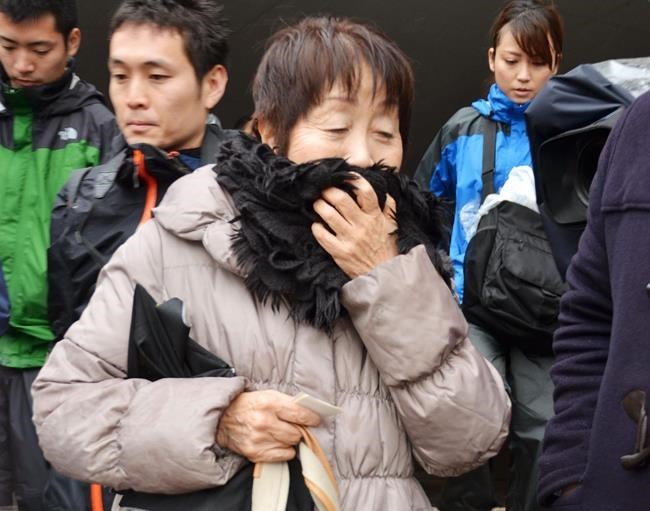
FILE - In this undated photo, Chisako Kakehi, center, answers to a reporter's question in Sakai, western Japan. A Japanese court has sentenced the woman to hang in a serial poisoning murder case targeting elderly men, including her husband. Kakehi, 70, was convicted Tuesday, Nov. 7, 2017, of killing her husband and two ex-partners, as well as in attempted murder of a fourth victim between 2007 and 2013. (Kyodo News via AP, File)
Republished November 07, 2017 - 3:29 AM
Original Publication Date November 07, 2017 - 2:06 AM
TOKYO - A Japanese court on Tuesday sentenced a 70-year-old woman to hang for the deaths of her husband and two other former partners, and the attempted murder of a fourth man.
Kyoto District Court convicted Chisako Kakehi of the deaths, which occurred between 2007 and 2013.
It said Kakehi poisoned the victims with cyanide after becoming the beneficiary of their wills.
Kakehi reportedly married at least three times and had three other partners who died, all within a few years of starting relationships with her, and amassed about 1 billion yen ($8.8 million) in inheritances over 10 years.
The so-called "poison woman" case surfaced when she was arrested in 2014 in the death of her 75-year-old husband. He died in December 2013, a month after they married. She was later charged with murdering two other men, her former boyfriends aged 71 and 75, and trying to kill a fourth, aged 79.
More than 560 people lined up for the 51 seats in the courtroom to hear Tuesday's ruling, NHK public television reported.
The court said traces of cyanide, which she confessed she obtained while running a printing plant, were found in all of the victims. Investigators discovered a small packet of cyanide buried in a flower pot that Kakehi allegedly tried to throw away. The court said she had the men take cyanide capsules, saying they were health supplements.
The court dismissed her lawyers' argument that she had dementia. Her defence also maintained she was innocent, citing insufficient evidence. Judge Ayako Nakagawa said Kakehi was fully responsible for her actions at the time, and that it was a carefully premeditated crime aimed at amassing inheritance money.
The court ruled that Kakehi was the only person with the victims at the time of their deaths and had immediately applied for her inheritance each time.
The defence appealed the verdict to a high court, which could take several years.
___
Follow Mari Yamaguchi on Twitter at twitter.com/mariyamaguchi
Find her work at https://www.apnews.com/search/mari%20yamaguchi
News from © The Associated Press, 2017